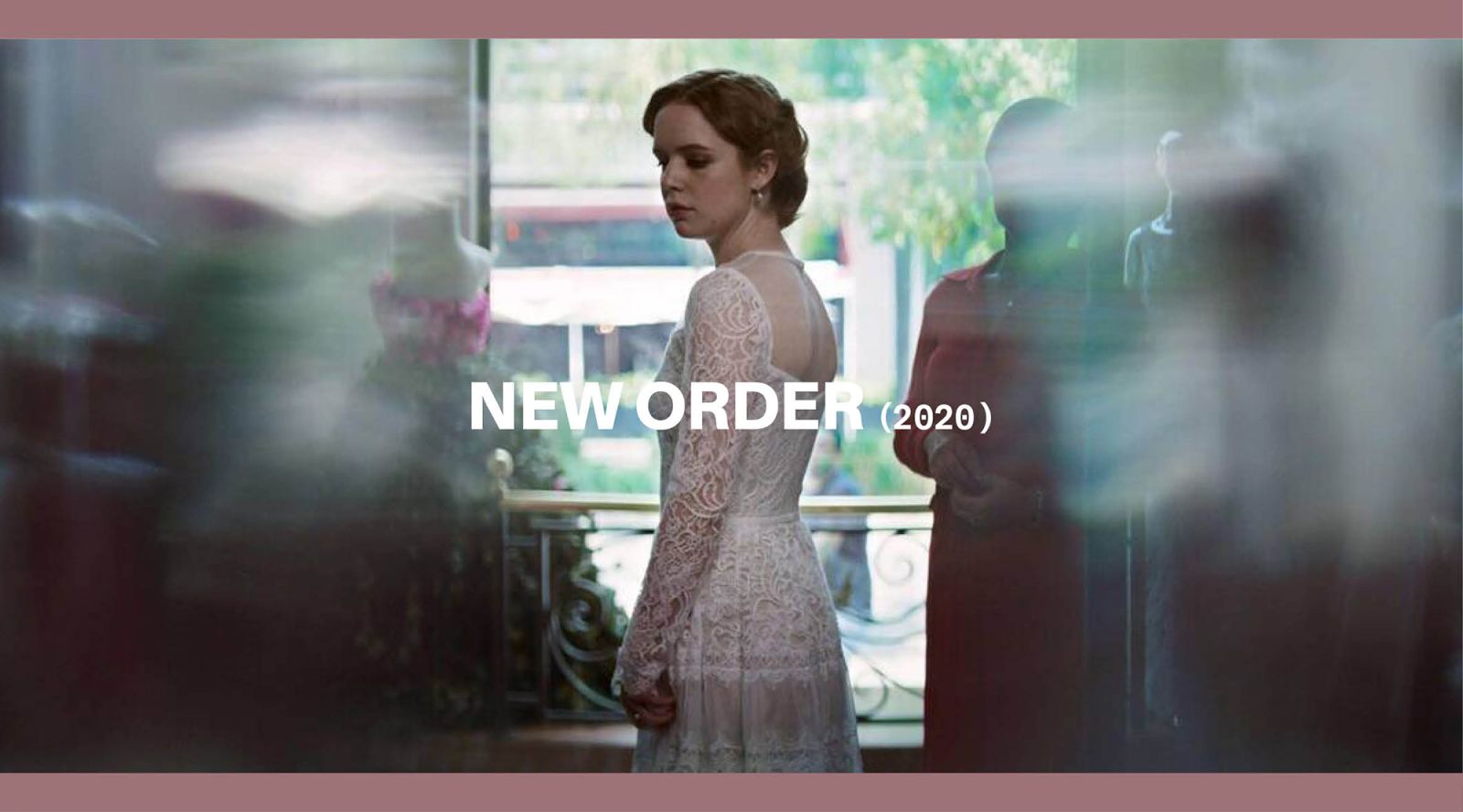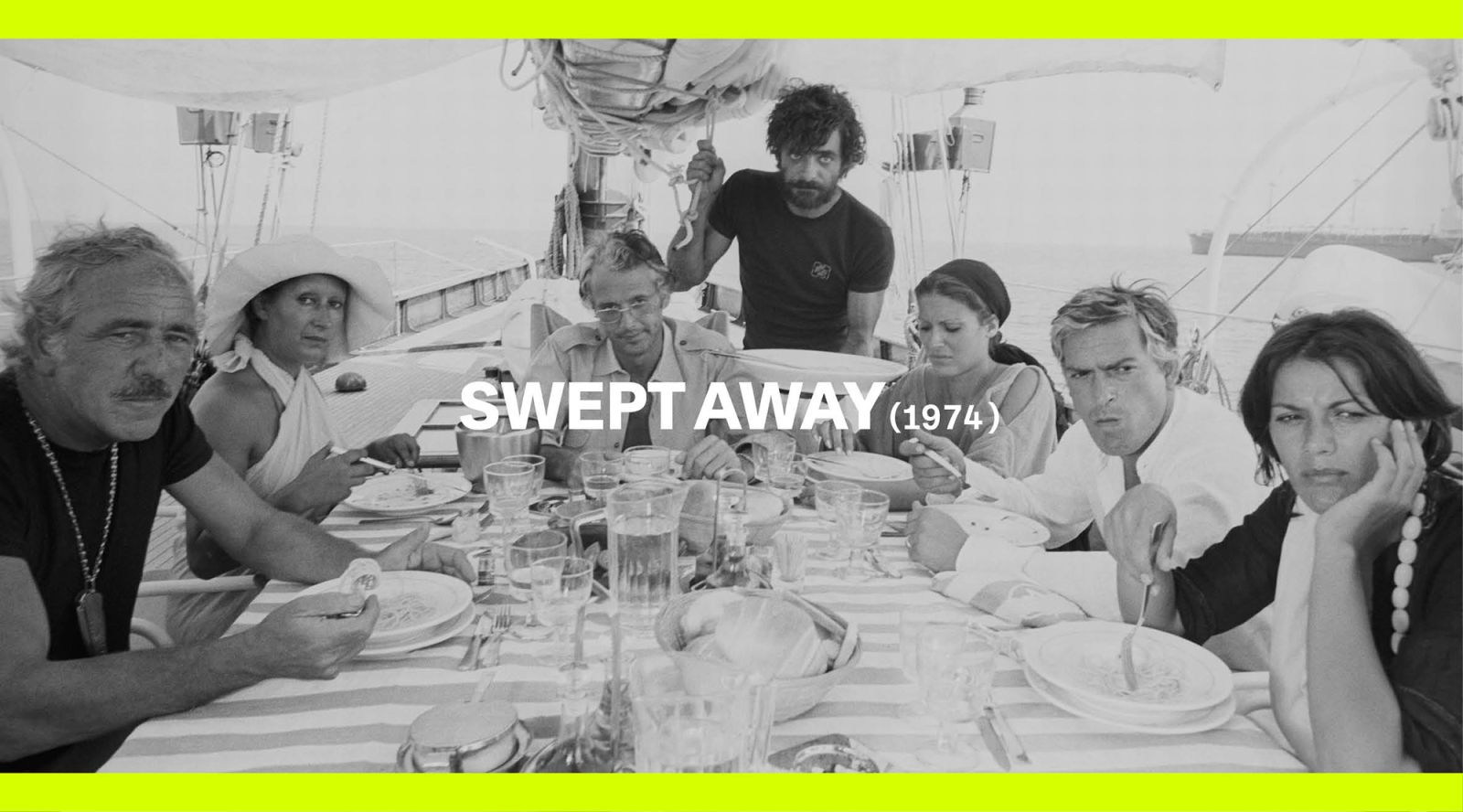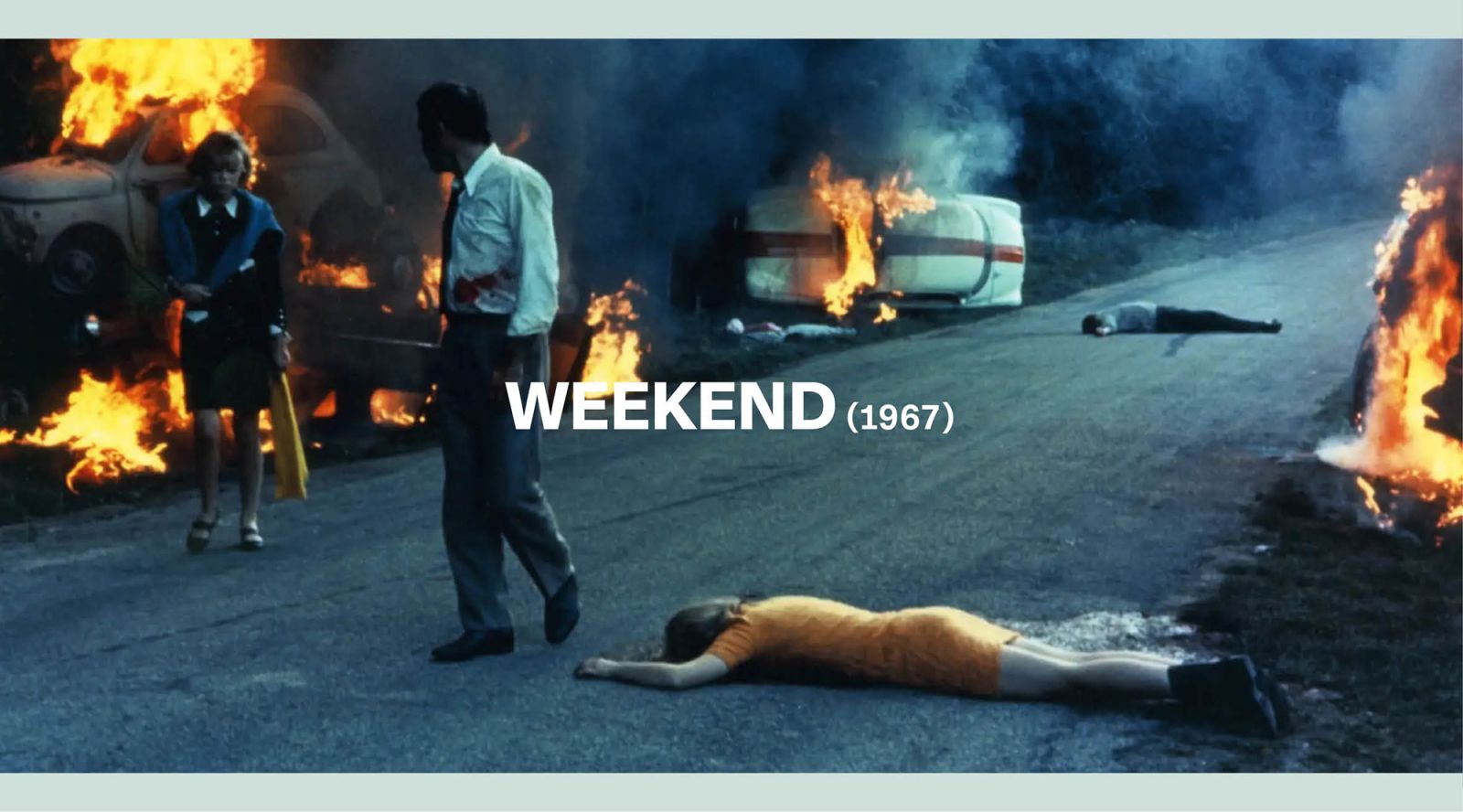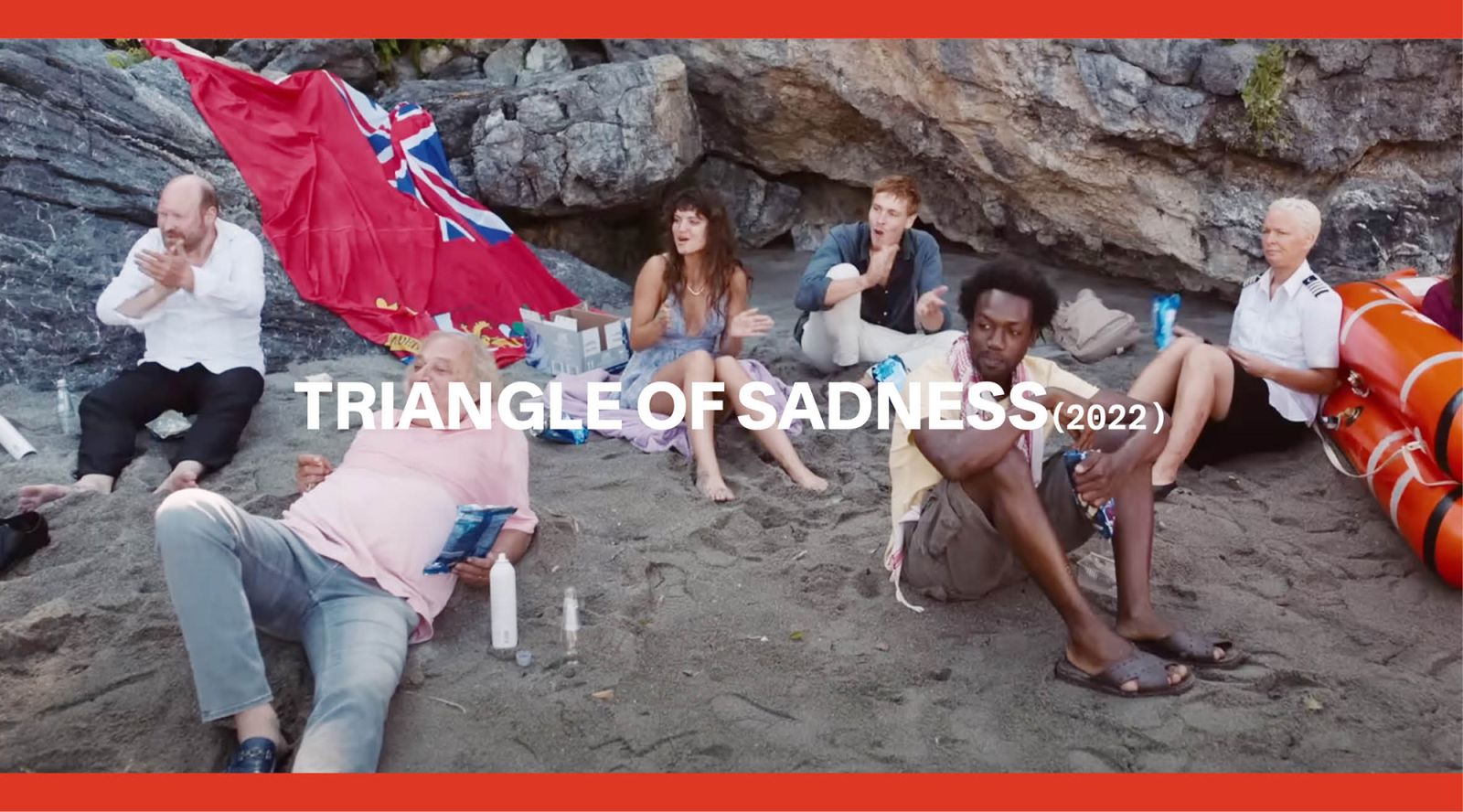Class Warfare Onscreen
By Hermione Hoby

Triangle of Sadness, dir. Ruben Östlund, 2022
outrageous fortune
Hermione Hoby
The best cinematic indictments of wealthy extravagance—from Triangle of Sadness and Parasite all the way back to The Rules of the Game—deftly manage to entertain as they skewer
February 27, 2023
AUTHOR READS
“Moviegoing isn’t really a civic duty,” film critic A.O. Scott observed in 2021, “but it can feel like a ritual of citizenship.” After our years of isolation and lonely laptop screens, that secular church of a theater or cineplex seems even more sacred. Lumbering out of these lockdown years, stumbling into a ragged, still not yet properly post-pandemic mess of polycrisis, the question rears its head: What should the obligations of today’s cinema be? Hollywood, of course, has always been eager to fulfill the public’s desire to be entertained as a single audience. This eternal promise of the movies puts a shimmer of utopianism in the notion of “mass entertainment,” a phrase that should also be considered in terms of that smaller mass—of one particular crowd in one particular place all watching the same movie. Yet you don’t get these comforts of belonging without the less cozy imperatives of civic duty. Surely one of the prime injustices to be reflected on-screen these days is wealth inequality.

Parasite, dir. Bong Joon-ho, 2019
One of the most dismaying effects of the pandemic has been the further enrichment of the extremely rich, and the increased economic suffering of almost everyone else. American billionaires had a grotesquely fantastic time of the pandemic: Their assets are now 50 percent higher than at the start of the catastrophe. This shameful situation informs a brace of recent films concerning class conflict, all of which face the same aesthetic challenge as their forebears: to toe the line between expressions of political rage and that other, almost contradictory imperative, to unite and delight.
When there’s nothing but spleen guiding the script, the result is something like the nasty, undisciplined nihilism of Michel Franco’s 2020 New Order. In Franco’s heartless vision, a Mexico City of the near future is extravagantly ravaged in a murderous uprising against the rich. Early scenes involve a high-society wedding in a chic minimalist house whose vast glass planes and sharp lines are reminiscent of the Park family home in Bong Joon Ho’s 2019 class-conflict masterpiece, Parasite—an architectural lingua franca of money suggests itself. In Franco’s film, the wedding is swarmed by sinister activists and the celebration turns into massacre. It’s not clear what’s caused this general uprising, or who exactly the violent protesters are or what they want, but the film is ready to put a bullet in the head of any character, especially the ones we initially hoped might be spared through their goodness. Franco appears to sneer at the notion of moral logic. In an interview with IndieWire, he offered this vague, scaremongering and possibly right-leaning statement: “New Order is just a way of saying, ‘Things have to change, otherwise we are headed in the wrong direction.’” Is he suggesting that Mexico needs tougher law and order to protect the rich? If so, the 86 minutes of the film are too exhausting in their cruelty to allow space for this idea. The wealthy are imprisoned, raped, abused, deceived and murdered, but the poor don’t fare much better: In a final, sadistic display of injustice, an innocent working-class mother and son (Mónica Del Carmen and Fernando Cuautle) meet a barbarous end. Various reviews deemed it a movie of “class warfare” but, squinting through all its blood, can any actual politics be discerned? The movie’s message (if such a thing can be wrested from it) is something like “Fuck everyone!” In that respect, it seems about as worthy of attention as a school shooter’s manifesto. Provocation is a useless and desensitizing tool when it’s provocation for provocation’s sake.

New Order, dir. Michel Franco, 2020
Conversely, when a director is too in thrall to the desire to entertain, attempts to indict wealthy extravagance end up as accidental endorsements. Baz Luhrmann’s characteristically glitzy but especially silly The Great Gatsby (2013) flails under the delusion that F. Scott Fitzgerald’s novel (arguably American literature’s greatest denunciation of wealth’s spiritual hollowness) is basically about how fabulous and glamorous it is to be glamorous and fabulous. Look at all these gorgeous rich people and their gorgeous money, cries the movie. It’s half heart-eyes emoji, half dollar-sign emoji, and those eyes are crossed. Damien Chazelle’s new movie, the giddy and mindless Babylon, set in the Hollywood of the late 1920s, appears to have fallen into the same starstruck trap—gesturing at critique while collapsing into orgiastic adulation.
By way of these bad examples, a good maxim arises: Say something worth saying about the world, but entertain while you do it. Godard did it, Wertmüller did it, as did Renoir and Buñuel and Losey. Now a fresh addition to the class-war canon arrives by way of Swedish filmmaker Ruben Östlund and his gleeful satire of the super-rich, Triangle of Sadness. The movie cannily, if imperfectly, navigates those eternal twin directives. Which, for a contemporary audience desperate to be entertained, and simultaneously embittered by these brutal, unjust years, take on more specific lineaments—namely, gratify us by way of the spectacular and visually egregious, but also serve us up some not too scary “eat the rich” style critique.
When a $250 million cruise yacht filled with vacationing billionaires sinks, its few survivors include both workers and guests, flung together into an instant mini society on a remote island. Here, where Rolexes and diamonds are worthless currency (what’s needed is food, water, shelter), the formidable maid Abigail (Dolly De Leon) seizes power. On board she was a toilet cleaner. On the island, through force of her personality but also through the plain fact that she, unlike the feckless others, can catch an octopus with her bare hands, she is captain, self-willed into rule. The script is flipped on the hierarchy of power, but depressingly, this reign pretty much recapitulates the one it’s replaced, albeit on smaller scale: De Leon is serious fun to watch, but her Abigail is nonetheless an oppressive tyrant who hoards the best for herself.

From left: Babylon, dir. Damien Chazelle, 2022; The Great Gatsby, dir. Baz Luhrmann, 2013
It turns out, another form of currency does still matter here—sexual attractiveness. Before they embarked on their doomed cruise, we saw the movie’s main characters, Yaya, an influencer, and Carl, a male model, squabbling over a dinner check. She makes more money through her looks than he does, so shouldn’t she pay? He wants things to be equal! So goes his fruitless, feminist argument. On the island, however, where the heterosexual Abigail runs the show and hoards the snacks, Yaya’s beauty isn’t worth much. Turns out, only Carl’s sexuality can be traded for pretzel sticks.
This, the movie’s publicists urged, was a film to be seen in a large group—“It’s a bit of a riot with a crowd,” wrote one in a press email. Its riotous flourishes include the karmic justice of an English couple who’ve become filthy rich from arms manufacturing getting hoisted by their own petard. “Oh, Winston, look. Isn’t this one of ours,” pipes Clementine to her husband, picking up a hand grenade lobbed onto deck by pirates. That, naturally, is the last we hear of Clementine. These are broad strokes, but satisfying ones: What sentient citizen wouldn’t want to see billionaire murderers blown up by bombs of their own making? As it sometimes does for the ship’s captain (Woody Harrelson), a line attributed to Karl Marx comes to mind: “The last capitalist we hang will be the one who sold us the rope.”
“WHAT SENTIENT CITIZEN
WOULDN’T WANT TO SEE BILLIONAIRE MURDERERS BLOWN UP BY BOMBS
OF THEIR OWN MAKING?”
This kind of riotousness goes some way to explaining the phenomenon of the film’s reception, by which I mean not just its laurels (it won the Palme d’Or and is nominated for three Academy Awards, including Best Picture) but also the way in which it’s been talked about—with the kind of giddy, meme-spawning hype now more common to hit TV shows. That kind of attention for an art-house film was last seen with Bong’s exquisitely calibrated Parasite, which instantly presented itself as another contemporary classic of class struggle. A wealthy Seoul family, the Parks, are infiltrated by a working-class family, the Kims, who live in a semi-basement and who turn (perhaps “twist” is more accurate) the tables on exploitation as they effectively take over the Parks’ house. Mr. Park, the poised paterfamilias, remarks that he can’t stand people who “cross the line.” Visually, this is a movie of lines, specifically horizontal planes—the lower class is literally lower—but what neither Mr. Park nor the Kims know at the outset is that there is another stratum to the house. Living in a bunker beneath the basement of the Parks’ home is a man in even more desperate straits than the Kims. Likewise, there are gradations aboard the yacht in Triangle of Sadness: In one painful scene the non-white below-deck crew are disturbed by the rabble of the all-white waitstaff above being pumped up to earn big tips. There is no simple us-and-them of poor and rich, but instead a hierarchy of cruel gradations.
Bong and Östlund are both attuned to the absurdity of the ruling class in their guileless, infantile dependence on the workers around them. Östlund’s movie, however, is more straightforward in its reversal. On the incredibly fancy yacht, staff can meet almost every whim of the capricious, spoiled adult babies aboard, including the venal, crazy-rich Russian Dimitry—a full-grown man who has his Nutella delivered by helicopter. (He’s played with chuckling depravity and gorgeous ugliness by Zlatko Buric.) Staff can even make obsequious promises to wash the vessel’s nonexistent sails. They cannot, however, do much about a storm at sea, and when one roils the Captain’s Dinner—the cruise’s apex of bougieness, in which quivering, fussy plate after quivering, fussy plate of foam and jelly and spume are placed before diamond-encrusted diners—jets of puke arc across the screen. Östlund then cranks the dials up another notch by throwing explosive plumbing and diarrhea into the melee. The expression shitshow is made graphic. Torrents of sewage cascade through the glossy interiors of the boat as if in some exultant ballet of desecration.
This outrageous confluence of ingestion (fine dining, champagne!) with its unmentionable and pursuant opposite (excretion!) evokes Luis Buñuel’s notorious conceit in 1974’s The Phantom of Liberty, in which these human habits are reversed. The bourgeois dining table is ringed with toilets, where guests merrily, socially do their business in front of one another, while the shameful act of eating is conducted in private behind decorously closed doors. Making small talk about a recent trip, one guest confesses: “We had to come home early. Madrid was filled with the stench of—pardon my language—food. Really indecent.”
In Triangle of Sadness, the barrel is smaller and the fish are bigger. There are various advantages to skewering billionaires on-screen. The 1 percent, what with being just 1 percent, do not account for a large portion of the film’s potential audience. So it is that “we,” the 99 percent, can jubilantly hate and hoot at them together, our wish for a common enemy fulfilled. Lampooning billionaires is safer, in other words, than the kinds of sly attacks on the middle classes mounted by Buñuel. Also, you get to ogle yachts and jewels. As Luhrmann knows, as do the makers of HBO’s tremendously popular Succession and The White Lotus, rich people and their luxury lives tend to be good to look at.

Swept Away, dir. Lina Wertmüller, 1974
Nonetheless, there’s something a lot more respectable and intelligent going on with Östlund’s film than cheap shots at the very rich. It’s salutary to be reminded that a person’s position in the class hierarchy is not a fixed category or set identity, but something contingent and circumstantial. The rich and powerful may easily become poor and weak. In this sense, Triangle of Sadness’s most obvious antecedent is another movie of power reversal, Lina Wertmüller’s Swept Away (1974). The movie opens on a swanky luxury yacht, one where once again the divide between the vacationing rich and the working poor who serve them is starkly demarcated. The regal-faced Mariangela Melato plays Raffaella Pavone Lanzetti, a haughty, motormouthed wealthy woman, tirelessly airing her scorn for leftist politics, while Giancarlo Giannini is Gennarino, a bushy-bearded and wild-eyed deckhand of Communist convictions. (They find their near-equivalent political mouthpieces in Triangle of Sadness when the socialist ship’s captain and the shamelessly capitalist Dimitry have a kind of quote-off. The latter is very satisfied with this line: “Socialism works only in heaven where they don’t need it, and in hell where they already have it.”)
As Gennarino eavesdrops on Raffaella’s outrageous speeches to her guests, his eyes bulge with fury: The guy looks as though he might explode. In a sense, he does—his revenge on Raffaella comes later. As soon as the film contrives to put these two class enemies in a small dinghy together (Raffaella has ordered Gennarino to take her to a swimming spot, overriding his warnings that it’s too late in the day for such an excursion), they present as a perfect comic pair. As with Triangle of Sadness, when you’re stranded on an uninhabited island, the power resides not with the person with the money but with the person who can catch a fish. In this case, that’s swarthy Gennarino. “Woman was born to serve man, not the other way round!” he snarls at her. Dismayingly, she capitulates to this misogyny, and their dynamic of subjugation and domination is reversed: Raffaella soon becomes a wretched, servile Woman Friday to Gennarino and his ballooning male chauvinism. A highly fucked-up “love story” unspools. (The movie is precursor to the comedy of 1987’s Overboard, with Goldie Hawn as amnesiac heiress and Kurt Russell as her exploitative carpenter.)
“SOCIALISM WORKS
ONLY IN HEAVEN
WHERE THEY DON’T NEED IT,
AND IN HELL
WHERE THEY ALREADY HAVE IT.”
The desert island, whether literal or otherwise, is a key feature of so many class-war movies, prevalent enough to suggest that it’s a prerequisite for their artistic success. These films seem to depend on a circumscribed zone of a setting, something like an Aristotelian unity of space, in which the dynamics of oppression, dependance, hierarchy, resentment and subjugation can play out in an intensified, high-stakes microcosm. Buñuel’s working title for 1962’s The Exterminating Angel was The Castaways of Providence Street, which more firmly places the movie in thematic relation to Triangle of Sadness and Swept Away. Fancy folk (the soon to be improvidential castaways) gather for a dinner at their host’s house, dressed in ball gowns and tuxedos. Mysteriously, the servants, without themselves knowing why, begin to flee. Nonetheless, their indignant employers press on with an opulent dinner. One soignée, well-coiffured guest calmly discusses a train crash in which “a third-class car full of village folk was squashed like an accordion.” She adds, blithely: “The misery of those wretches didn’t move me.” We’re clearly in satirical territory. Soon, however, we’re also in the realm of the supernatural, or at least the inexplicable. As night turns into morning, the guests find themselves unable to leave. The haute-bourgeois living room becomes the desert island, a patch of territory whose resources are finite. In desperation, one man offers his girlfriend the dirty water left in a vase of flowers. Finally, a wall is hacked into and a pipe split open and the guests (if we can still call them that: By this point, disheveled and unwashed and starved, they certainly look like shipwreck survivors) gather round, stretching out their cups like supplicants, desperate with thirst. One elderly guest dies, a pair of lovers commit suicide in a closet, and everyone, dead or alive, begins to stink. At one point, surviving guests call for the sacrificial death of their host.
Jean-Luc Godard acknowledged The Exterminating Angel as a key influence on him, particularly in his making of 1967’s Weekend. The movie begins with a well-heeled and adulterous couple, Roland and Corinne, plotting to murder each other but also quite possibly Corinne’s father too, in order to secure her inheritance. With this we recognize their Buñuelian nature—wolves dressed in sheep’s clothing, or rather, savages dressed in Hermès. Indeed: “My Hermès handbag!” shrieks Corinne, aghast at a violent, flaming car crash that has claimed the life of her beloved accessory, along with some trifling human being. (She ignores the smoldering corpse tumbling to the ground on her left.) The film is chaotic, antic, absurdist, picaresque and jaggedly confrontational. It culminates with a bunch of hippie cannibals killing, roasting and ingesting Roland. Corinne joins in too, placidly munching on her husband’s flesh and remarking that she’ll save a bit for later. The rich, at least one of them, is literally eaten.

Weekend, dir. Jean-Luc Godard, 1967
Four years before this, director Joseph Losey served up a film simpatico in its class politics but worlds apart in tone and style. His sly and discomfiting jewel of a movie, 1963’s The Servant, sees Dirk Bogarde as Barrett, a buttoned-up manservant to an indolent toff called Tony (James Fox) who’s just moved into a large London townhouse. Östlund chose to blast his audience with shit, but through Losey’s lens, the intimations of the unsanitary are far more insidious and hence a lot more discomfiting. We’re dealing with the English after all, so naturally this is in part a movie about repression. In the opening scene, Barrett walks smoothly down a London street, pausing briefly outside plumber Thomas Crapper’s store, whose name, accompanied by royal insignia, blazes from the signage. Yet the princely seal can’t obscure the fact that we associate Crapper’s name with a synonym for feces. The lordly, so the sly implication goes, are indeed full of shit. Crappiest of all, however, is not so much the lords themselves as the system in which they and their working-class counterparts find themselves. As in Bong’s film, a dynamic can be mutually parasitic.
In his first meeting with his prospective employer, Barrett enters the house and walks through its rooms like he owns the place, until he comes across Tony sprawled asleep in a chair, oblivious as a baby. For a moment, Barrett simply stands and stares at his future taskmaster, looming over him with the suggestion of concealed distaste, even contempt. It’s a remarkably sinister moment; this is a film that unsettles rather than spectacularizes. What follows is an inexorable and increasingly dark shift of power, charged with homoeroticism as Barrett gains ascendancy within the house, bullying and duping his weak employer, who descends into feebleness and alcoholism. The dynamic is later echoed in Christopher Miles’s The Maids (1975), an adaptation of the Jean Genet play Les Bonnes, in which a pair of resentful maids plot revenge on Madame.
The grandfather of all these movies, however, the ne plus ultra from which all the rest have followed, is Jean Renoir’s 1939 The Rules of the Game. It is also likely the most humane movie ever made about class. The setting is a grand chateau, the epoch is the eve of World War II, and the cast is composed of two sets of characters, in a now-classic upstairs-downstairs formation of the rich and their servants. The mode is one of mournful farce as these characters become cat’s-cradled with infidelities, deceptions and jealousies, culminating in a fatal case of mistaken identity.
Darting throughout proceedings, in a tragicomic court-jester role reminiscent of Twelfth Night’s Feste, is Octave. He’s played by Renoir himself, who speaks the movie’s most indelible line: “The awful thing about life is this: Everyone has their reasons.” Those words—so generous, compassionate and melancholy—brought back to me an image from Triangle of Sadness and helped recast it in a more humane light. Dimitry, the crazy-rich Russian, cradles the pale, washed-up corpse of his wife at the shore, weeping—a pietà. And then he stealthily inches off her ring, detaches her necklace, stashes both in one of his shoes, and the pathos is ruptured. There’s black humor in the vulgarity of the gesture—that this awful Croesus of a man should think to pocket the valuables. But is there any chance that he might also just be a desperate, grieving husband, wishing to have and to hold some memento of his beloved wife? Possibly. Or possibly he’s both. Either way, even this guy had his reasons.

Triangle of Sadness, dir. Ruben Östlund, 2022


